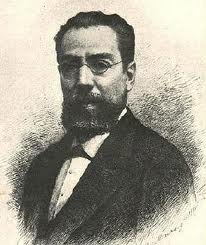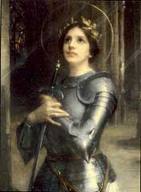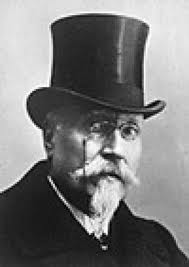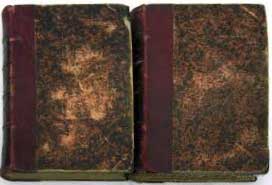Realism theatre: José Echegaray & Manuel Tamayo y Baus
As with poetry, the theatre during the Realism movement barely changes in comparison to the Romantic theatre of the first half of the 19th century.
Theatre of the Spanish Realism and Naturalism

The theatre during the Spanish Realism describes an arc from the more conservative and uncritical stances to the more progressive and acid ones; from the comedies of Adelardo López de Ayala and Ventura de la Vega to the ethically restless plays of Benito Pérez Galdós and the steely criticism of Enrique Gaspar, who wrote for the minorities. There's also a renewed interest in Costumbrism, which reflected the more conservative bourgeois through genres like the zarzuela or the sainete. Theatre was mainly a way of entertainment or of evading from reality, and it didn't pose any moral questions. There was also a movement to revitalize the topics of moral and honor in the plays, as well as the historic dramas which had been so popular during Romanticism.
Manuel Tamayo y Baus - Life and Works
Manuel Tamayo y Baus was born in Madrid in 1829. His whole family was related to the theatre world in some way or the other, and his first years of life were spent traveling with his parent's theatre company. His first plays are more Romantic, but he soon started veering towards Realism and the high comedy, entwined with the Neoclassic comedies of Bretón de los Herreros and Moratín.

He began his literary career by adapting foreign works into the Spanish language. His first one was "Juana de Arco", based on The Maid of Orleans by Schiller. He becomes famous with the tragedy "Virginia" (1853), which represents Claudio's abuse of Virginia. His great success was "La rica hembra" (1854) and "Locura de amor" (1855), a historical drama about the jealousy of Joanna the Mad and her husband, Philip the Beautiful, which perfectly shows the influence of Schiller on Tamayo.
His better known play is "Un drama nuevo" (1867), inspired in the Shakespearean plays, where his genius mind mixed the topic of the "theatre within the theatre" and adultery. In 1870 his play "Los hombres de bien" was a resounding failure, and he decided to quit his literary career. Tamayo was named lifetime secretary of the Royal Spanish Academy in 1874 and director of the National Spanish Library in 1884. He'd already composed over 50 plays. He died in June of 1898.
José Echegaray - Life and Works

José Echegaray y Eizaguirre was born in Madrid in 1832. He spent his childhood in Murcia, where he developed his love for maths. At 14 he left for Madrid to prepare himself for his enrolment in the "Escuela de Ingenieros de Caminos, Canales y Puertos de Madrid", from where he graduated top of his class at the age of 20, and where he worked as a teacher from 1854 to 1868. He left for Granada and Almería soon after his graduation to pursue his first job.
Echegaray had always cultivated liberal ideas, both in economics and politics. After the Glorious Revolution of 68, in which he didn't take part, he helped secure the new regime taking several different political positions. After the downfall of Amadeo de Saboya (1873), he supported the First Spanish Republic as Minister of Finance. His republican ideals stayed with him even after the restoration of the monarchy in 1874, but he also took part in this government as member of the monarchic Courts, so he'd be able to defend his management from the more conservative members. Echegaray helped found the Republican Progressive Party in 1880 and finally accepted becoming part of the politics of the Restoration in the left wing of Sagasta's Liberal Party.
Echegaray was a man of immense prestige, president of the Ateneo in Madrid in 1888, director of the Royal Academy of the Spanish Language in 1896, Senator for life (1900) and twice president of the "Academia de Ciencias Exactas, Físicas y Naturales", once from 1894 to 1896 and again from 1901 to 1916, among many other titles.

His literary activity began in 1865 with "La hija natural", which was never represented on stage, so his real start as a play writer was in 1874 with "El libro talonario". He wrote 67 plays, 34 of them in verse. Echegaray was awarded the Nobel Prize of Literature in 1904, much to the dismay of the Spanish literates of the time, who didn't think much of his works. However, at the beginning of the 20th century Echegaray was very well considered, and most of his works had seen a lot of success in Paris, London, Berlin and Stockholm. He died in Madrid in 1916.

